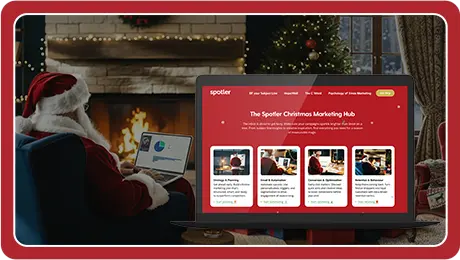Ends
Christmas Marketing Hub
Brain Study Reveals Best Way of Engaging Customers Online

I'm a Chartered Marketer with over two decades in marketing. When I’m not running Spotler's marketing, you might find me speaking at an event or arguing with my inbox. I sometimes even manage to put pen to paper.
Written by:

Related blogs
“Breakup emails”: how to re-engage your coldest subscribers
Every marketer has a segment they avoid looking at too closely: the cold list.
Galentine’s Day: the fastest growing seasonal trend marketers should pay attention to
Galentine’s Day has grown from a small cultural moment into one of February’s most commercially...
Keep expanding your knowledge
“Breakup emails”: how to re-engage your coldest subscribers
Every marketer has a segment they avoid looking at too closely: the cold list.
Galentine’s Day: the fastest growing seasonal trend marketers should pay attention to
Galentine’s Day has grown from a small cultural moment into one of February’s most commercially interesting trends.
B2B Valentine’s ideas: campaigns that will not make tour audience cringe
Heart emojis and pink colour palettes are less likely to move your business customers. But there are other ways to make use of Valentine’s Day.
How to use personalisation without making it creepy this Valentine’s Day
Buyers want the personal touch, but they don’t want you too close. How do you get the balance right this Valentines Day?
Love, loyalty and LTV: turning Valentine’s shoppers into year-round customers
How do you turn your Valentine’s shoppers from spring fling to long-term relationship?
7 ways to make emails more interactive in 2026
Inboxes are more competitive than ever; it is estimated that 376.4 billion emails were sent every day in 2025.
Become the Brand AI Recommends First. Understanding Citation Authority for 2026
One of the biggest emerging opportunities is citation analysis and citation building for AI platforms. Find out how you can get AI to cite your brand via GEO.
The Anti-Valentine’s playbook: campaign ideas for the single, cynical and unbothered
“Anti” doesn’t have to mean “bad”: How to engage with the rise of alternatives to Valentine’s Day
Figaro Digital | Winter Digital Marketing Summit London
Spotler will be at Figaro Digital's Winter Digital Marketing Summit this February. We'd love to see you there! The summit is a great day out for marketers looking for solutions.
Love at first click: Pre and Post Valentine’s campaigns that deliver real revenue
With the right pre and post Valentine’s campaigns, you can lift revenue, strengthen your data and turn one off shoppers into loyal customers. Join us to find out how!

